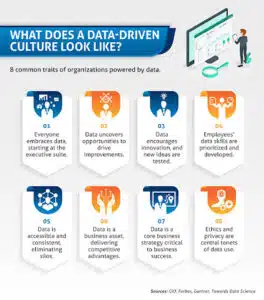
Nehal
- March 28, 2023
- Data, Organization’s Operations
- Blog, Data
Introduction
Statistically speaking, 92.7% of organizations have started to invest in AI and big data analytics. With rapid demand and accelerating growth of technology, now more than ever, it is imperative for businesses to make a change.
In today’s data-driven industry, the smooth functioning of the organization is closely related to the ability of the company to adapt to the transformations. With a flooding amount of data in enterprise, the questions that arise are ‘what is to be done with this data?’How can it be used for the benefit of the organization?’. Among these, one question that holds the attention span of every industry expert is, ‘Can data improve your organization’s operations?’ Let’s find out!
What is Meant by ‘Data-driven’?
As per the estimates, the data to be produced globally by the year 2025 amounts to 175 zettabytes, and companies with a more data-driven approach grow 30% more every year. but what does are leveraged to identify new business opportunities, improve customer service, grow sales, and improve operations, As a result, organization’s operations are able to make informed decisions and develop detailed plans to succeed in their business goals using evidence- based data.

Data means utilizing insights and taking a more evidence-based approach when it comes to decision-making. This approach involves using advanced analytics tools and techniques to identify patterns, trends, and relationships in the data, which can be used to optimize processes, increase efficiency, and improve performance. The ultimate goal of a data-driven approach is to leverage data to drive business outcomes, improve decision-making, and achieve a competitive advantage.
Data: The Ultimate Tool for the Efficient Business Operations
There is no denying the fact that data can improve an organization’s operations by providing valuable insights and information that can be used to optimize processes, make better decisions, and increase efficiency and profitability. With the explosion of digital technology and the increasing amount of data available, businesses have access to more data than ever before. They can use it to their advantage in a variety of ways.
Listed below are a few pointers that prove the ways in which data can improve your organization’s operations:
Elimination of inefficiency:
Companies are constantly looking for ways to improve their operational efficiency and productivity, and a data-based approach is becoming increasingly popular in achieving these goals. A company can pinpoint areas where improvements can be made by analyzing the data generated by its business operations, such as reducing waste, increasing efficiency, or improving communication between departments. Businesses can also use context and content analysis to understand their data better, categorizing it into different types based on their relevance and sensitivity. For instance, they can store cold data in low-cost object storage and consolidate multiple data lakes into a centralized data ocean to reduce redundancies and duplication. By leveraging data in enterprise this way, companies can further optimize their operations and stay ahead of the competition.
Enhancing quality and accuracy:
Real-time monitoring of business processes and the tracking of key performance indicators (KPIs) can significantly enhance the procedure quality and accuracy in enterprises. By leveraging data, businesses can quickly identify and address abnormalities in order to maintain high standards. Furthermore, data analysis allows for the tracking of process metrics, the identification of trends, and the rapid detection of gaps that require remediation. The examination of historical information can also reveal patterns and trends indicating future challenges and recommending effective remediation measures. Consistently implementing these steps can greatly improve product quality, efficiency, and performance in organizations.
Better communication and transparency:
To improve decision-making, save time, and uncover valuable insights, enterprises can reconsider how they distribute and utilize data. One way to achieve this is by democratizing data, and making it available to every user, regardless of technical expertise. By doing so, businesses can gain an in-depth view of the customers, encourage innovation, facilitate hybrid work, and enhance customer experience. To ensure effective data interoperability, democratization, and literacy, it is important to communicate insights and share them via various departments. By fostering a collaborative culture around data, organizations can improve their ability to make informed decisions and gain a competitive advantage.
Streamlining workflows:
One effective technique for developing an efficient workflow is to use internal data to identify which tasks are operating effectively and which ones are wasting time and money. With data analytics, processes can be dynamically managed at all levels of a business, and tasks can be automatically initiated based on performance. Data analysis assists managers in evaluating the effectiveness of current workflows, analyzing process results, automating new workflows, and continuously improving them. By using data, leaders can also assess whether any processes are burdensome, costly, or difficult to use. They can also accelerate their digital initiatives by transitioning from manual workflows prone to errors to optimized and automated procedures.
Assessing productivity:
Leveraging data can assist in evaluating the outcomes of various initiatives aimed at increasing productivity as well as identifying the ones that are most effective. Based on this feedback, enterprises can modify existing programs or create new ones to enhance productivity further. Moreover, data can aid in tracking employee performance, recognizing where they need further assistance or training, and implementing relevant training programs. Through data analysis, businesses can increase operational productivity and provide their employees with opportunities for upskilling.
Along with the above-mentioned aspects of a data-driven business environment, it also enables you to identify new business opportunities. This can further lead to incurring additional revenues and creating new products and services to serve the customers better. Businesses can use data to gain valuable and efficient insight; for instance, in a manufacturing industry, it is possible to gain insights into productivity and efficiency by using operational data derived from systems and machines. Developing strategies to streamline critical operational areas can be achieved by learning which processes cause delays.
Conclusion
The inculcation of data in enterprise is sure to enhance your operations and give you the first-mover advantage. Furthermore, you can also predict future trends, learn about changing consumer behavior and adapt to rapid changes easily. From gaining insightful information to understanding the needs of the consumers, data-driven decisions can do wonders for an organization if you wish to learn more about the importance of data and how you can implement it in your business operations, head over to the PromptCloud website
Sharing is caring!




















